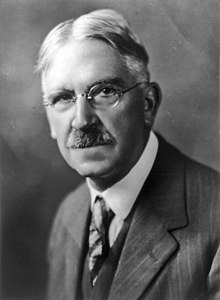
Back بوابة:ليبرالية Arabic Portal:Liberalizm Azerbaijani Πύλη:Φιλελευθερισμός Greek Portail:Libéralisme French Портал:Либерализм Russian ද්වාරය:ලිබරල්වාදය Singhalese Portal:Liberalizm Turkish Portal:自由主义 Chinese
The Liberalism portal
Liberalism is a political and moral philosophy based on the rights of the individual, liberty, consent of the governed, political equality, the right to private property and equality before the law. Liberals espouse various and often mutually warring views depending on their understanding of these principles but generally support private property, market economies, individual rights (including civil rights and human rights), liberal democracy, secularism, rule of law, economic and political freedom, freedom of speech, freedom of the press, freedom of assembly, and freedom of religion. Liberalism is frequently cited as the dominant ideology of modern history.
Liberalism became a distinct movement in the Age of Enlightenment, gaining popularity among Western philosophers and economists. Liberalism sought to replace the norms of hereditary privilege, state religion, absolute monarchy, the divine right of kings and traditional conservatism with representative democracy, rule of law, and equality under the law. Liberals also ended mercantilist policies, royal monopolies, and other trade barriers, instead promoting free trade and marketization. Philosopher John Locke is often credited with founding liberalism as a distinct tradition based on the social contract, arguing that each man has a natural right to life, liberty and property, and governments must not violate these rights. While the British liberal tradition has emphasized expanding democracy, French liberalism has emphasized rejecting authoritarianism and is linked to nation-building. (Full article...)
Selected article -
The New Freedom was Woodrow Wilson's campaign platform in the 1912 presidential election, and also refers to the progressive programs enacted by Wilson during his time as president. First expressed in his campaign speeches and promises, Wilson later wrote a 1913 book of the same name. After the 1918 midterm elections, Republicans took control of Congress and were mostly hostile to the New Freedom. As president, Wilson focused on various types of reform, such as the following:
- Tariff reform: This came through the passage of the Underwood Tariff Act of 1913, which lowered tariffs for the first time since 1857 and went against the protectionist lobby.
- Labor reform: This was achieved through measures such as the Eight Hour Law for Women of the District of Columbia, the Seaman’s Act, Workmen’s Compensation for Federal employees, the Federal Child Labor Bill, and the Adamson Act. During the 1912 campaign Wilson spoke in support of workers organizing into unions while endorsing "the betterment of men in this occupation and the other, the protection of women, the shielding of children, the bringing about of social justice.”
- Business reform: This was established through the passage of the Federal Trade Commission Act of 1914, which established the Federal Trade Commission to investigate and halt unfair and illegal business practices by issuing "cease and desist" orders, and the Clayton Antitrust Act.
- Agricultural reform: This was achieved through measures such as the Cotton Futures and Smith-Lever Acts of 1914, the Grain Standards and Warehouse Acts of 1916, and the Smith-Hughes Act of 1917.
- Banking reform: This came in 1913 through the creation of the Federal Reserve System and in 1916 through the passage of the Federal Farm Loan Act, which set up Farm Loan Banks to support farmers. (Full article...)
Selected biography -

John Dewey (/ˈduːi/; October 20, 1859 – June 1, 1952) was an American philosopher, psychologist, and educational reformer. He was one of the most prominent American scholars in the first half of the twentieth century.
The overriding theme of Dewey's works was his profound belief in democracy, be it in politics, education, or communication and journalism. As Dewey himself stated in 1888, while still at the University of Michigan, "Democracy and the one, ultimate, ethical ideal of humanity are to my mind synonymous." Dewey considered two fundamental elements—schools and civil society—to be major topics needing attention and reconstruction to encourage experimental intelligence and plurality. He asserted that complete democracy was to be obtained not just by extending voting rights but also by ensuring that there exists a fully formed public opinion, accomplished by communication among citizens, experts, and politicians. (Full article...)
List of selected biographies
|
|---|
Selected quote
General images
Subcategories
Related portals
WikiProjects
Topics
Recognized content
Associated Wikimedia
The following Wikimedia Foundation sister projects provide more on this subject:
-
Commons
Free media repository -
Wikibooks
Free textbooks and manuals -
Wikidata
Free knowledge base -
Wikinews
Free-content news -
Wikiquote
Collection of quotations -
Wikisource
Free-content library -
Wikiversity
Free learning tools -
Wiktionary
Dictionary and thesaurus


























































